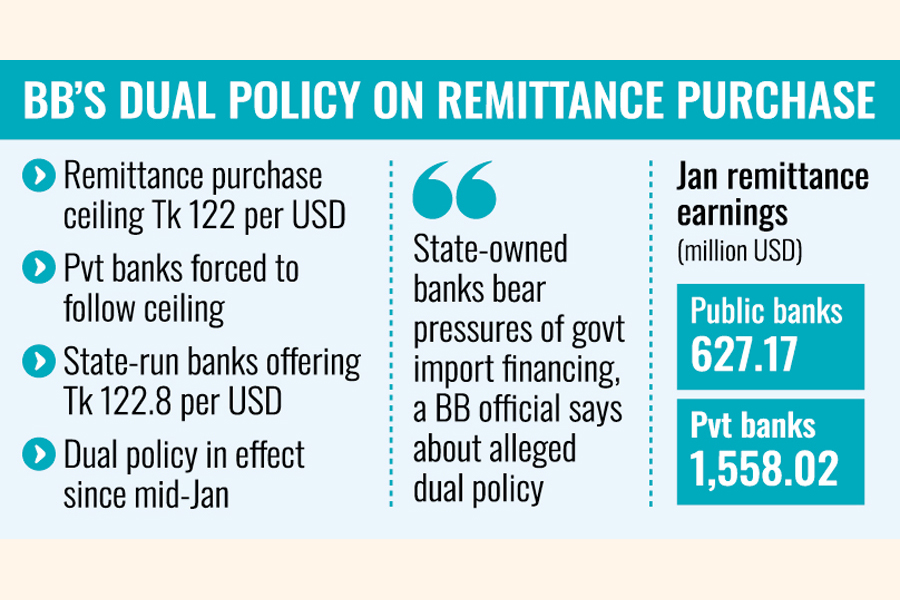Double-dealing in remittance purchase
Regulatory policy skewed towards govt banks on exchange rate
Private bankers bound within upper ceiling, public lenders offer higher rates

Published :
Updated :

Regulatory policy on remittance netting is allegedly skewed towards public banks on exchange rate as private bankers are bound within the fixed upper ceiling while the government lenders offering higher rates.
Bangladesh Bank (BB) is now favouring the state-owned commercial banks for collection of more remittances even bypassing the upper ceiling of the existing managed floating exchange rate, bankers and officials said.
On the other hand, the country's central bank has intensified its regulation over many of the private commercial banks to make them purchase remittance within the upper ceiling at Tk 122 a dollar of the recently introduced reference-rate-driven taka-dollar exchange mechanism, according to them.
The market players say such "dual policy" of the banking regulator on the foreign-exchange market has been observed since mid-January 2025 and the public banks are now offering rates as high as Tk 122.80 a dollar to the remitters.
As a matter of fact, the remittance flow into the public commercial banks continues growing while many of the leading remittance-earning private banks see a sharp fall in remittance coffers in recent days.
"If we look at the bank-wise remittance-related data of the just-concluded month of January, the sharp growth of the public banks in terms of sourcing remittance becomes clear," says one market-insider.
According to the BB, the public banks earned a total of $627.17 million in the form of remittance in January. In the first 18 days, the government lenders had brought $309 million against $317 million they purchased in the remaining 13 days of the month.
On the other hand, private banks had bought $897 million until January 18 while the remaining $661.02 million was collected in the last 13 days, according to the official data.
Seeking anonymity, a BB official says the public banks are largely engaged in government imports, including foodstuffs. So, the payment pressure on the state-owned banks is much higher. "This could be a reason if the BB really favours the government banks."
The FE correspondent talked to more than a dozen bank executives, including managing directors and treasury officials, over the recent behaviour of the forex market. But all of them agreed to share their thoughts on conditions of not being quoted by name.
Treasury head of a leading private commercial bank said the central bank intensified its inspection on a number of private ones that prompted them to buy remittance within the range of Tk 122 a dollar.
On the other hand, the treasury official said, the central bank allows government banks to buy the greenback bypassing the upper ceiling in the existing exchange-rate arithmetic.
"Now, public banks are buying remittance as high as Tk 122.80 per dollar till today (January 31). This is a dual policy of the regulator," he said.
Treasury head of another private commercial bank said some of leading exchange houses had also been instructed not to sell remittance to their banks. "We, on average, buy remittance amounting to $60 million per month. But the volume dropped to $31 million this month because of the dual policy."
Contacted, the treasury head of a state-owned commercial bank admitted the development, saying that they have been offering rates higher than Tk 122 a dollar following the green signal from the central bank.
"We report it to the BB although some of the SoCBs did not do so. But we stopped doing so for the last couple of days last month following BB's instructions," he said.
jubairfe1980@gmail.com


 For all latest news, follow The Financial Express Google News channel.
For all latest news, follow The Financial Express Google News channel.